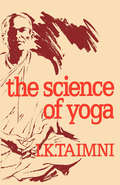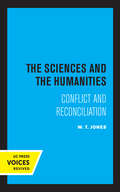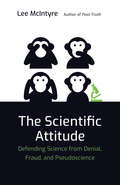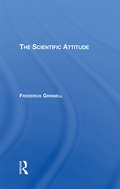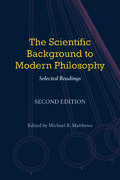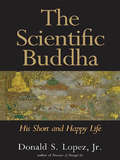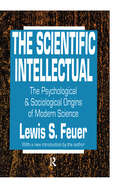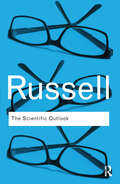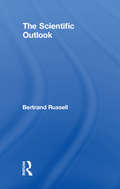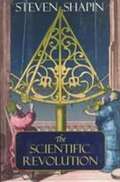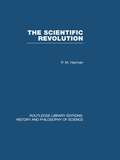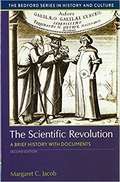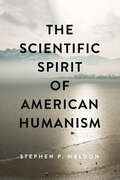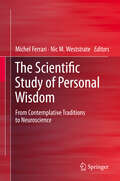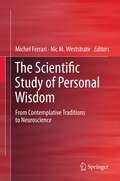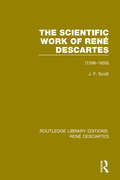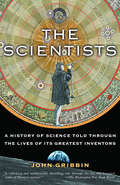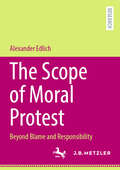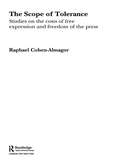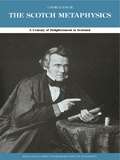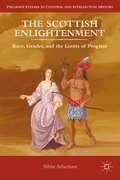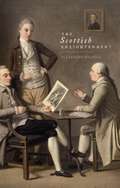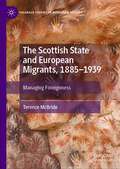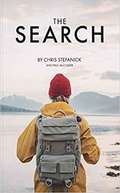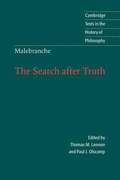- Table View
- List View
The Sciences and the Humanities: Conflict and Reconciliation
by W. T. JonesThis title is part of UC Press's Voices Revived program, which commemorates University of California Press’s mission to seek out and cultivate the brightest minds and give them voice, reach, and impact. Drawing on a backlist dating to 1893, Voices Revived makes high-quality, peer-reviewed scholarship accessible once again using print-on-demand technology. This title was originally published in 1965.
The Scientific Attitude: Defending Science from Denial, Fraud, and Pseudoscience (The\mit Press Ser.)
by Lee McIntyreAn argument that what makes science distinctive is its emphasis on evidence and scientists' willingness to change theories on the basis of new evidence.Attacks on science have become commonplace. Claims that climate change isn't settled science, that evolution is “only a theory,” and that scientists are conspiring to keep the truth about vaccines from the public are staples of some politicians' rhetorical repertoire. Defenders of science often point to its discoveries (penicillin! relativity!) without explaining exactly why scientific claims are superior. In this book, Lee McIntyre argues that what distinguishes science from its rivals is what he calls “the scientific attitude”—caring about evidence and being willing to change theories on the basis of new evidence. The history of science is littered with theories that were scientific but turned out to be wrong; the scientific attitude reveals why even a failed theory can help us to understand what is special about science. McIntyre offers examples that illustrate both scientific success (a reduction in childbed fever in the nineteenth century) and failure (the flawed “discovery” of cold fusion in the twentieth century). He describes the transformation of medicine from a practice based largely on hunches into a science based on evidence; considers scientific fraud; examines the positions of ideology-driven denialists, pseudoscientists, and “skeptics” who reject scientific findings; and argues that social science, no less than natural science, should embrace the scientific attitude. McIntyre argues that the scientific attitude—the grounding of science in evidence—offers a uniquely powerful tool in the defense of science.
The Scientific Attitude: Second Edition (The\conduct Of Science Ser.)
by Frederick GrinnellScience is many things: a way of thinking and an activity of individuals in the laboratory; a highly structured institution that recruits, instructs, and regulates its members; a sensitive, interactive, and integrated segment of modern culture and society. Professor Frederick Grinnell presents in this valuable text and survey a clear and comprehensive introduction to all these aspects of science from the point of view of the scientist. Using many examples, drawn primarily from the biomedical sciences but also from everyday life, the author provides the ideal general Introduction to science studies. He goes beyond narrow considerations of methodology to consider broader questions of science as attitude, process, institution, and social force. The text is enhanced by the author's familiarity with several philosophical traditions and the light they throw on the scientific attitude. The text Is straightforward, free of jargon, and completely accessible to beginning students as well as to scientists and laypersons. Professional scholars will also profit from the book's unique blending of the various perspectives on science.
The Scientific Background to Modern Philosophy: Selected Readings
by Michael R. MatthewsThrough a collection of works from key thinkers in natural philosophy, the second edition of The Scientific Background to Modern Philosophy illuminates the central role scientific writing played in developing modern philosophical thought. This revised and expanded edition includes many new translations and incorporates works by foundational eighteenth- and nineteenth-century thinkers not in the first edition, including selections from works by Jean-Baptiste, le Rond d&’Alembert, Denis Diderot, Émilie Du Châtelet, Jean-Jacques Rousseau, Joseph Priestley, Immanuel Kant, Carl Linnaeus, William Paley, and Charles Robert Darwin. These new additions provide students with a more comprehensive understanding of the scientific context in which the major philosophical works of the modern era were written and complement the selections from works by Nicolaus Copernicus, Francis Bacon, Galileo Galilei, René Descartes, Robert Boyle, Christiaan Huygens, and Isaac Newton that are retained from the first edition.
The Scientific Buddha: His Short and Happy Life
by Donald S. Lopez Jr.This book tells the story of the Scientific Buddha, "born" in Europe in the 1800s but commonly confused with the Buddha born in India 2,500 years ago. The Scientific Buddha was sent into battle against Christian missionaries, who were proclaiming across Asia that Buddhism was a form of superstition. He proved the missionaries wrong, teaching a dharma that was in harmony with modern science. And his influence continues. Today his teaching of "mindfulness" is heralded as the cure for all manner of maladies, from depression to high blood pressure. In this potent critique, a well-known chronicler of the West's encounter with Buddhism demonstrates how the Scientific Buddha's teachings deviate in crucial ways from those of the far older Buddha of ancient India. Donald Lopez shows that the Western focus on the Scientific Buddha threatens to bleach Buddhism of its vibrancy, complexity, and power, even as the superficial focus on "mindfulness" turns Buddhism into merely the latest self-help movement. The Scientific Buddha has served his purpose, Lopez argues. It is now time for him to pass into nirvana. This is not to say, however, that the teachings of the ancient Buddha must be dismissed as mere cultural artifacts. They continue to present a potent challenge, even to our modern world.
The Scientific Intellectual: The Psychological & Sociological Origins of Modern Science
by Lewis S. FeuerThe birth of modern science was linked to the rise in Western Europe of a new sensibility, that of the scientific intellectual. Such a person was no more technician, looking at science as just a job to be done, but one for whom the scientific stand-point is a philosophy in the fullest sense. In The Scientific Intellectual, Lewis S. Feuer traces the evolution of this new human type, seeking to define what ethic inspired him and the underlying emotions that created him.Under the influence of Max Weber, the rise of the scientific spirit has been viewed by sociologists as an offspring of the Protestant revolution, with its asceticism and sense of guilt acting as causative agents in the rise of capitalism and the growth of the scientific movement. Feuer takes strong issue with this view, pointing out how it is at odds with what we know of the psychological conditions of modern societies making for human curiosity and its expression in the observation of and experiment with nature.Feuer shows that wherever a scientific movement has begun, it has been based on emotions that issue in what might be called a hedonist-libertarian ethic. The scientific intellectual was a person for whom science was a 'new philosophy,' a third force rising above religious and political hatreds, seeking in the world of nature liberated vision, a intending to use and enjoy its knowledge. In his new introduction to this brilliantly readable volume, Professor Feuer reviews the book's critical reception and expands the scope of the original edition to include fascinating discussions of Francis Bacon, Thomas Edison, Charles Darwin, Thomas Hardy, and others. The Scientific Intellectual will be of interest to scientists and intellectual historians.
The Scientific Outlook
by Bertrand RussellAccording to Bertrand Russell, science is knowledge; that which seeks general laws connecting a number of particular facts. It is, he argues, far superior to art, where much of the knowledge is intangible and assumed. In The Scientific Outlook, Russell delivers one of his most important works, exploring the nature and scope of scientific knowledge, the increased power over nature that science affords and the changes in the lives of human beings that result from new forms of science. Insightful and accessible, this impressive work sees Russell at his very best.
The Scientific Outlook (Routledge Classics Ser.)
by Bertrand Russell'A scientific opinion is one which there is some reason to believe is true; an unscientific opinion is one which is held for some reason other than its probable truth.' - Bertrand RussellOne of Russell's most important books, this early classic on science illuminates his thinking on the promise and threat of scientific progress. Russell considers three questions fundamental to an understanding of science: the nature and scope of scientific knowledge, the increased power over nature that science affords, and the changes in the lives of human beings that result from new forms of science. With customary wit and clarity, Russell offers brilliant discussions of many major scientific figures, including Aristotle, Galileo, Newton and Darwin.With a new introduciton by David Papineau, King's College, London.
The Scientific Revolution
by Steven ShapinA historical exploration of the origins of the modern scientific worldview. The author rejects the idea that there was anything like a "revolution" in early modern science, instead asserting that scientific knowledge was advanced through social practices for social purposes, and was met as much with skepticism and rejection as with celebration and praise. Annotation c. by Book News, Inc. , Portland, Or.
The Scientific Revolution (Routledge Library Editions: History & Philosophy of Science)
by Peter HarmanOriginally published in 1983.This volume outlines some of the important innovations in astronomy, natural philosophy and medicine which took place in the sixteenth and seventeenth centuries, and shows how the transformation in world-view during the period was affected by broader historical terms. Themes such as the spread of Puritanism, the decline of witchcraft and magic, and the incorporation of science as an integral part of the intellectual milieu of late seventeenth-century England.
The Scientific Revolution: A Brief History with Documents (The Bedford series in History and Culture)
by Margaret JacobThe Scientific Revolution highlights the difficulty of engaging, discarding, or assimilating religious paradigms in the course of scientific development. Jacob's introduction outlines the trajectory of the Scientific Revolution and argues that the revival of ancient texts in the Renaissance and the upheaval of the Protestant Reformation paved the way for science.
The Scientific Spirit of American Humanism (Medicine, Science, and Religion in Historical Context)
by Stephen P. WeldonThe story of how prominent liberal intellectuals reshaped American religious and secular institutions to promote a more democratic, science-centered society.Recent polls show that a quarter of Americans claim to have no religious affiliation, identifying instead as atheists, agnostics, or "nothing in particular." A century ago, a small group of American intellectuals who dubbed themselves humanists tread this same path, turning to science as a major source of spiritual sustenance. In The Scientific Spirit of American Humanism, Stephen P. Weldon tells the fascinating story of this group as it developed over the twentieth century, following the fortunes of a few generations of radical ministers, academic philosophers, and prominent scientists who sought to replace traditional religion with a modern, liberal, scientific outlook. Weldon explores humanism through the networks of friendships and institutional relationships that underlay it, from philosophers preaching in synagogues and ministers editing articles of Nobel laureates to magicians invoking the scientific method. Examining the development of an increasingly antagonistic engagement between religious conservatives and the secular culture of the academy, Weldon explains how this conflict has shaped the discussion of science and religion in American culture. He also uncovers a less known—but equally influential—story about the conflict within humanism itself between two very different visions of science: an aspirational, democratic outlook held by the followers of John Dewey on the one hand, and a skeptical, combative view influenced by logical positivism on the other. Putting America's distinctive science talk into historical perspective, Weldon shows how events such as the Pugwash movement for nuclear disarmament, the ongoing evolution controversies, the debunking of pseudo-science, and the selection of scientists and popularizers like Carl Sagan and Isaac Asimov as humanist figureheads all fit a distinctly American ethos. Weldon maintains that this secular ethos gained much of its influence by tapping into the idealism found in the American radical religious tradition that includes the deism of Thomas Paine, nineteenth-century rationalism and free thought, Protestant modernism, and most important, Unitarianism. Drawing on archival research, interviews, and a thorough study of the main humanist publications, The Scientific Spirit of American Humanism reveals a new level of detail about the personal and institutional forces that have shaped major trends in American secular culture. Significantly, the book shows why special attention to American liberal religiosity remains critical to a clear understanding of the scientific spirit in American culture.
The Scientific Study of Personal Wisdom
by Michel Ferrari Nic M. WeststrateThe rich and diverse contributions to this volume span a wide variety of disciplines, from psychology and philosophy to neuroscience, by some of the most influential scholars in the emerging science of personal wisdom. As such, it is a collection of essential readings and the first publication to integrate both the spiritual and pragmatic dimensions of personal wisdom. The content of the book goes beyond speculative theory to present a wealth of scientific research currently under way in this expanding field. It also describes numerous promising methods now being deployed in the quest for scientific knowledge of the elusive, yet critical, phenomenon of personal wisdom. The book is an excellent introduction to the field for novice researchers as well as a stimulating and enlightening resource for established experts. Its broad appeal makes it a vital addition to the libraries of academics and practitioners in many disciplines, from developmental psychology to gerontology and from philosophy to contemplative religious traditions such as Buddhism.
The Scientific Study of Personal Wisdom: From Contemplative Traditions to Neuroscience
by Michel Ferrari and Nicholas WeststrateThe rich and diverse contributions to this volume span a wide variety of disciplines, from psychology and philosophy to neuroscience, by some of the most influential scholars in the emerging science of personal wisdom. As such, it is a collection of essential readings and the first publication to integrate both the spiritual and pragmatic dimensions of personal wisdom.The content of the book goes beyond speculative theory to present a wealth of scientific research currently under way in this expanding field. It also describes numerous promising methods now being deployed in the quest for scientific knowledge of the elusive, yet critical, phenomenon of personal wisdom. The book is an excellent introduction to the field for novice researchers as well as a stimulating and enlightening resource for established experts. Its broad appeal makes it a vital addition to the libraries of academics and practitioners in many disciplines, from developmental psychology to gerontology, and from philosophy to contemplative religious traditions such as Buddhism.
The Scientific Work of René Descartes: 1596-1650 (Routledge Library Editions: Rene Descartes)
by J. F. ScottWhen originally published in 1952, this book filled a gap in the history of philosophy and science and remains an important work today, because it puts the main mathematical and physical discoveries of Descartes in an accessible form, for the benefit of English readers. Descartes is acknowledged to be the founder of modern mathematics, through his invention of analytical geometry and this volume charts Descartes’ role in bringing a unity into algebra and geometry and the development of mathematics into a discipline which could be properly analysed. Carefully paraphrasing the Géométrie, this volume retains much of Descartes’ original notation as well as the original diagrams. The volume also discusses the considerable contribution that Descartes made to the physical sciences which involved accurate work in optics, light, sight and colour.
The Scientists: A History of Science Told Through the Lives of Its Greatest Inventors (Britannica Guides)
by John GribbinA wonderfully readable account of scientific development over the past five hundred years, focusing on the lives and achievements of individual scientists, by the bestselling author of In Search of Schrödinger’s CatIn this ambitious new book, John Gribbin tells the stories of the people who have made science, and of the times in which they lived and worked. He begins with Copernicus, during the Renaissance, when science replaced mysticism as a means of explaining the workings of the world, and he continues through the centuries, creating an unbroken genealogy of not only the greatest but also the more obscure names of Western science, a dot-to-dot line linking amateur to genius, and accidental discovery to brilliant deduction.By focusing on the scientists themselves, Gribbin has written an anecdotal narrative enlivened with stories of personal drama, success and failure. A bestselling science writer with an international reputation, Gribbin is among the few authors who could even attempt a work of this magnitude. Praised as “a sequence of witty, information-packed tales” and “a terrific read” by The Times upon its recent British publication, The Scientists breathes new life into such venerable icons as Galileo, Isaac Newton, Albert Einstein and Linus Pauling, as well as lesser lights whose stories have been undeservedly neglected. Filled with pioneers, visionaries, eccentrics and madmen, this is the history of science as it has never been told before.
The Scope of Moral Protest: Beyond Blame and Responsibility
by Alexander EdlichThe book highlights a neglected aspect of our moral practices: we can morally protest objectionable conduct without blaming agents for it. In this way, moral responses to wrongful conduct are possible without assessing the blameworthiness of agents. The book offers an account of moral protest as a type of stance-taking: in protest, the protester commits themselves to treating what they protest as morally objectionable, which is related to a specific class of moral emotions. The aptness conditions of moral protest and the concept of objectionability are discussed and this perspective is applied to a critical discussion of the attributionist view of blameworthiness and corresponding views of blame. It concludes that our moral practices allow for more variation than is often acknowledged, some of which unrelated to moral responsibility, and that this gives us reason not to insist on a broad view of blameworthiness. Specifically, it is argued that the significance of morally objectionable conduct and the needs of victims of wrongdoing can be done justice to without blame. The book thus suggests that moral protest without blame may be called for more often than we think, including for many types of wrongdoers whose culpability is disputed.
The Scope of Tolerance: Studies on the Costs of Free Expression and Freedom of the Press (Extremism and Democracy #Vol. 7)
by Raphael Cohen-AlmagorOne of the dangers in any political system is that the principles that underlie and characterize it may, through their application, bring about its destruction. Liberal democracy is no exception. Moreover, because democracy is relatively a young phenomenon, it lacks experience in dealing with pitfalls involved in the working of the system - the ‘catch’ of democracy. This is an interdisciplinary study concerned with the limits of tolerance, this ‘democratic catch’, and the costs of freedom of expression. Rights are costly, and someone must pay for them. We can and should ask about the justification for bearing the costs, weighing them against the harms inflicted upon society as a result of a wide scope of tolerance. While recognizing that we have the need to express ourselves, we should also inquire about the justifications for tolerating the damaging speech and whether these are weighty enough. This book combines theory and practice, examining issues of contention from philosophical, legal and media perspectives and covers such issues as: media invasion into one’s privacy offensive speech incitement hate speech holocaust denial media coverage of terrorism. This book is essential reading for anyone who has research interests in political theory, extremism, and free speech.
The Scotch Metaphysics: A Century of Enlightenment in Scotland (Routledge Studies in Nineteenth-Century Philosophy #Vol. 1)
by George E. DavieFocusing on the works of Thomas Reid, Dugald Stewart, Sir William Hamilton, Thomas Brown and James Frederick Ferrier, this book offers a definitive account of an important philosophical movement, and represents a ground-breaking contribution to scholarship in the area. Essential reading for philosophers or anyone with an interest in the history of philosophical thought.
The Scottish Enlightenment
by Silvia SebastianiExamines how the difference between monogenist and polygenist accounts of the origin of the human race was reflected in, and helped to shape, Scottish Enlightenment accounts of society's progress through historical stages. Reveals how concepts of race and the role of women were treated by historians, philosophers, and other thinkers.
The Scottish Enlightenment: Essays In Reinterpretation (Rochester Studies In Philosophy Ser. #1)
by Alexander BroadieThis authoritative anthology covers the many contributions to science, philosophy and economics made by the great minds of 18th century Scotland. Through the eighteenth and into the nineteenth centuries, Scotland saw an explosion of intellectual activity in the realms of philosophy, law, economics, politics, linguistics and the physical sciences. Great thinkers such as Adam Smith, David Hume, Adam Ferguson, Thomas Reid, James Hutton, and many others formulated many of the ideas that would become foundational to modernity. This anthology collects some of the most significant works by Scottish Enlightenment thinkers as well as lesser-known writings that have not been reprinted for centuries. Arranged thematically, it includes sections on Human Nature, Ethics, Aesthetics, Religion, Economics, Social Theory and Politics, Law, Historiography, Language and Science. Scottish philosopher and intellectual historian Alexander Broadie sheds light on the significance of these writings through his masterful introduction as well as commentary throughout.&“A major contribution to our literature and intellectual resources and I do not think it could be better done . . . For many people this book will become a companion for years or even a lifetime.&” —Scotsman, UK
The Scottish State and European Migrants, 1885–1939: Managing Foreignness (Palgrave Studies in Migration History)
by Terence McBrideThis book examines the efforts of the government in Scotland to manage the increase of migrants travelling to Britain at the end of the nineteenth century. Focussing on the period between 1885 and 1939, the book explores how the Scottish machinery of government handled the administration of ‘foreigners.’ The author uses a comparative, thematic approach to analyse migrant experiences, identities, and relationships with state institutions. Drawing from state records held by the National Records of Scotland in Edinburgh, the book argues that Scottish officials in semi-autonomous boards began to recognise, describe and enumerate the presence of the ‘foreigner’ in the early twentieth century, framing their handling of foreignness in accordance with the Aliens Act of 1905. The author goes on to explain that institutions operating in Scotland developed a distinctly Scottish approach to alien matters, which continued up until the Second Word War. Therefore, an increasing number of importantdecisions affecting migrants were taken by a distinctly Scottish machinery of government, impacting on how Scottish officials understood foreignness, and how those identified as foreigners understood their identity in relation to Scottishness. Contributing significantly to current heated debates on migration and identity amongst researchers and the general public in Europe and beyond, this book provides essential insights into the ways in which a ‘sub-state’ began to develop practices, processes and attitudes towards migration which were not always in line with that of the central government.
The Search (What Every Catholic Should Know)
by Augustine InstituteFor all the unprecedented changes we have seen in the past few years, the essential human questions are still the same. <p><p> Who am I? What do I want? Is there a point to my life? <p><p> More than likely, you have a nagging feeling, a yearning to understand your place in the cosmos. You wonder. You question. You explore. Welcome to the human story. Welcome to The Search. <p><p> The Search unflinchingly tackles the core questions of life, examining the many options you have and the many signposts that point you to potentially life-changing answers. <p><p> Whether you are a keen inquirer or a jaded skeptic, The Search will speak to you. You may be reassured by some parts and challenged by others. Either way, you will find a lot here to think about. And when all is said and done, these life questions demand to be answered. <p><p> Are you ready for The Search?
The Search After Truth: With Elucidations of The Search After Truth (Cambridge Texts In The History Of Philosophy Series)
by Nicolas Malebranche Thomas M. Lennon Paul J. OlscampThis book is the author's first, longest and most important work; this volume also presents the Elucidations which accompanied its third edition, the result of comments that the author solicited on the original work and an important repository of his theories of ideas and causation. Together, the two texts constitute the complete expression of his mature thought, and are written in his subtle, argumentative and thoroughly readable style. They are presented in the distinguished translations by Thomas M. Lennon and Paul J. Olscamp, together with a historical introduction, a chronology of Malebranche's life, and useful notes on further reading.
